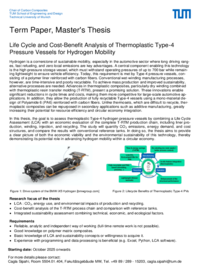Life Cycle and Cost-Benefit Analysis of Thermoplastic Type-4 Pressure Vessels for Hydrogen Mobility
- Institut
- Lehrstuhl für Carbon Composites
- Typ
- Semesterarbeit Masterarbeit
- Inhalt
- theoretisch
- Beschreibung
Hydrogen is a cornerstone of sustainable mobility, especially in the automotive sector where long driving ranges,
fast refueling, and zero local emissions are key advantages. A central component enabling this technology
is the high-pressure storage vessel, which must withstand operating pressures of up to 700 bar while remaining
lightweight to ensure vehicle efficiency. Today, this requirement is met by Type-4 pressure vessels, consisting
of a polymer liner reinforced with carbon fibers. Conventional wet-winding manufacturing processes,
however, are time-intensive and poorly recyclable. To achieve mass production and improved sustainability,
alternative processes are needed. Advances in thermoplastic composites, particularly dry winding combined
with thermoplastic resin transfer molding (T-RTM), present a promising solution. These innovations enable
significant reductions in cycle times and costs, making them more competitive for large-scale automotive applications.
In addition, they allow the production of fully recyclable Type-4 vessels using a mono-material design
of Polyamide 6 (PA6) reinforced with carbon fibers. Unlike thermosets, which are difficult to recycle, thermoplastic
composites can be repurposed in secondary applications such as additive manufacturing, greatly
increasing their potential for resource efficiency and circular economy integration.
In this thesis, the goal is to assess thermoplastic Type-4 hydrogen pressure vessels by combining a Life Cycle
Assessment (LCA) with an economic evaluation of the complete T-RTM production chain, including liner production,
winding, injection, and recycling. The study will quantify CO₂ emissions, energy demand, and cost
structures, and compare the results with conventional reference tanks. In doing so, the thesis aims to provide
a clear picture of both the economic viability and the environmental sustainability of this technology, thereby
demonstrating its potential role in advancing hydrogen mobility within a circular economy.
Research focus of the thesis
• LCA : CO₂, energy use, and environmental impacts of production and recycling.
• Cost-benefit analysis of the T-RTM process chain and comparison with reference tanks.
• Integrated sustainability assessment combining technical, economic, and ecological factors.- Voraussetzungen
Requirements
• Reliable, analytic and independent way of working (full-time remote work is not possible).
• Good knowledge on polymer matrix composites.
• Basic knowledge of LCA and sustainability concepts or willingness to acquire it.
• Experience with programming and data processing is beneficial (e.g. Excel, Python, LCA software).
Starting date: October 2025 onwards- Möglicher Beginn
- Oktober
- Kontakt
-
Cagla Sipahi
Raum: 5504.01.404
Tel.: +498928915203
cagla.sipahitum.de - Ausschreibung
-
